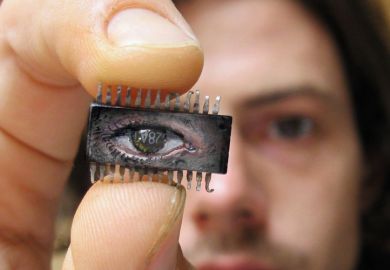Asking an invigilator to prowl the university exam hall has long been a simple and effective way to stop students from cheating.
But how do you prevent candidates from sneaking a look at notes or even googling answers if they are taking an online exam in the privacy of their own home? The solution, according to US researchers, is to monitor the rotation of students’ heads.
Researchers at Arizona State University claim they are able to predict, with an accuracy of 75.6 per cent, whether online candidates are cheating based on whether they turn their heads or not and whether there is a pause in answering a question, according to a study published in the journal Higher Education Research and Development.
In the paper, titled “Detecting probable cheating during online assessments based on time delay and head pose”, authors Chia Yuan Chuang, Scotty D. Craig and John Femiani explain how they filmed the head movements of 42 first-year students as they took a short online exam.
When students were allowed to have written notes on the exam subjects with them, the position of their head changed noticeably – indicating they were looking off-screen at the materials, the authors state.
While this was not enough to conclude definitively that students were cheating, it showed that a student was “behaving in a manner that is consistent with cheating”, the paper says.
This may “provide the possibility of building a proctoring system that could flag suspicious students in remotely administered exams automatically” and “reliably rule out a large portion of exam recordings as inconsistent with cheating using an automated method”.
The research comes amid growing interest in creating reliable systems of online assessment that are not open to flagrant cheating.
In April 2016, the European Union announced that it was funding a €7 million (£5.9 million) project into online assessment using facial, voice and keystroke identification technology.
The Adaptive Trust-based E-assessment System for Learning (Tesla) initiative, which aims to encourage more universities to launch online courses, will be piloted in 2018 with a cohort of 14,000 students before being developed into a product available for purchase by institutions.
However, the latest study highlights that such approaches must be assessed carefully. Although its success rate in identifying those cheating was 75.6 per cent, a further 10 per cent of cases were falsely flagged as showing misconduct.
Use of time delay and head position analysis should therefore be viewed only as “as one potential resource which can help in the detection of cheating behaviors”, the paper says.
Register to continue
Why register?
- Registration is free and only takes a moment
- Once registered, you can read 3 articles a month
- Sign up for our newsletter
Subscribe
Or subscribe for unlimited access to:
- Unlimited access to news, views, insights & reviews
- Digital editions
- Digital access to THE’s university and college rankings analysis
Already registered or a current subscriber?









